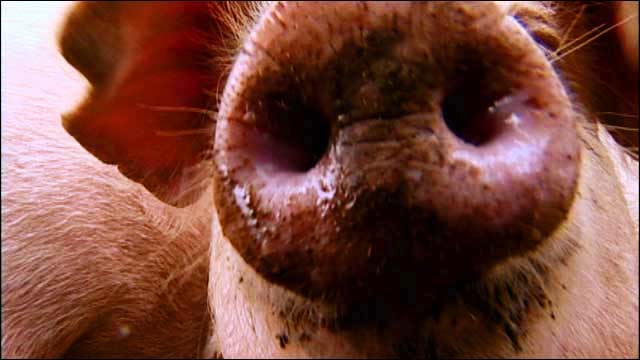The Use of antibiotics in livestock and the possible connections to the emergence of a super bug.
Published: March 27, 2009. You may have read that in 2005, there were 18,000 known deaths in the US that resulted from a type of Staph bacteria, Methicillin-Resistant Staphylococcus Aureus (MRSA), pronounced mer-sa. MRSA (Staph) is resistant to broad-spectrum antibiotics, and has recently been discovered in pigs (and farm workers), on farms in Iowa and Illinois. You may also have read that more people died from MRSA than died of AIDS, over the same period of time.
While that information may be accurate as a whole, the relationship between MRSA deaths (in general) and the swine strain (in particular) are quite misleading. MRSA causes more than one type of disease depending upon its strain. There are many Staph strains of MRSA, those widely associated with community outbreaks; and those associated with outbreaks in hospitals. There is one main type of MRSA found to be associated with swine and swine workers (MRSA ST398), and it has only recently been identified here in the US.*
In a phone interview today, I spoke with the author of a ground-breaking study to survey the incidence of swine MRSA on a select number of farms in Iowa and Illinois. Tara Smith, Associate Professor with the University of Iowa’s Department of Epidemiology, and her team, conducted this pilot study on US swine, and swine workers. The results of her survey showed a substantial prevalence of MRSA ST398 on one farm production system, and a high degree of spread not only through the general swine population, but also to the swine workers where the strain was identified. This is the first study to document the presence of MRSA ST398 in the US, though it has been previously identified on farms in Canada, the Netherlands, and Denmark.
As there are a number of bacterial strains that fall under the umbrella of MRSA, along with many different disease symptoms, MRSA ST398 (in the US) is not known to be associated with any human disease. However, a study conducted in the Netherlands has documented cases connecting ST398 with human illnesses, in some case, quite serious ones.
The community associated strains (MRSA ST398 falls into this group) can produce a wide array of human symptoms from skin rashes, and raised pimples, that may develop into more serious instances of bacterial meningitis, sepsis (blood poisoning), and bacterial pneumonia. Typically, community associated strains are more virulent in nature than the hospital associated strains. In general MRSA Staph are of particular concern to health officials because of their broad-spectrum resistance to antibiotic treatment. Some (MRSA) strains are resistant to all but the last line of defense antibiotics, and can be life threatening even with those treatments.
At the present time, there are more questions about MRSA ST398 on farms, and in meat, than we know as answers. Since our public health agencies appear to be taking a wait and see approach, there are no comprehensive studies underway addressing the broader potential health concerns. What is the connection, if any, between antibiotic use in livestock and the emergence of MRSA in animals and humans? Does MRSA ST398 pose a risk to humans, and if so, to what degree?
Antibiotics are essential to the livestock industry, and certainly serve a legitimate, and essential purpose in protecting the health of animals, and by extension farm workers, and those of us who consume meat products. Why, beyond actual treatment for disease, is there a need to rely on these critically important drugs for non-therapeutic use (except in limited circumstances, for limited periods of time) when antibiotic resistance is such a serious world-wide concern? Is there a substantial link between widespread antibiotic use with livestock, and a growing antibiotic resistance found in humans?
Toward the end of our conversation, I asked Dr. Smith about what may follow next from her research study. With an enthusiastic laugh, she responded:
Oh, we have lots of next steps. At this point, that’s what is great about the research, we really have more questions than answers, right now… That’s our next direction of research, to really understand a little more about this particular strain [ST398], and see if it’s really a cause for concern as far as human disease goes, or its more of a concern as far as there being a lot of people out there who are carrying Staph, that have the Methicillin-Resistant genes, that could combine with other potentially more virulent human species of Staph.
*ST398 has been the main type associated with pigs, but other strains have been found in pigs in other countries. Dr. Smith informs me of a group in Canada led by Scott Weese that has found a different MRSA type, one that is connected with the hospital-associated strains.

